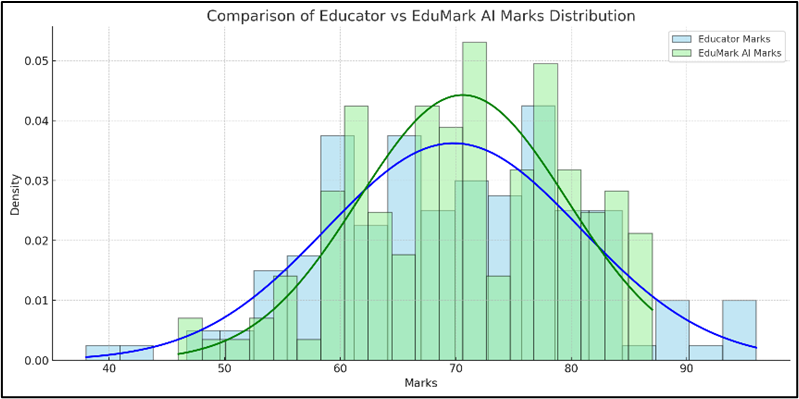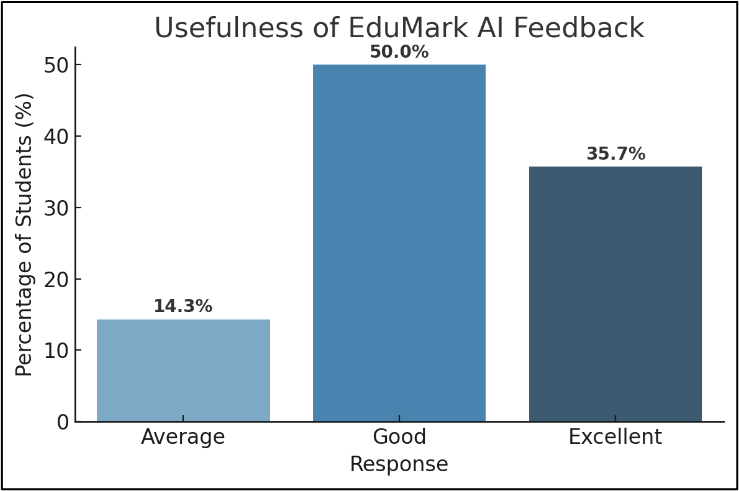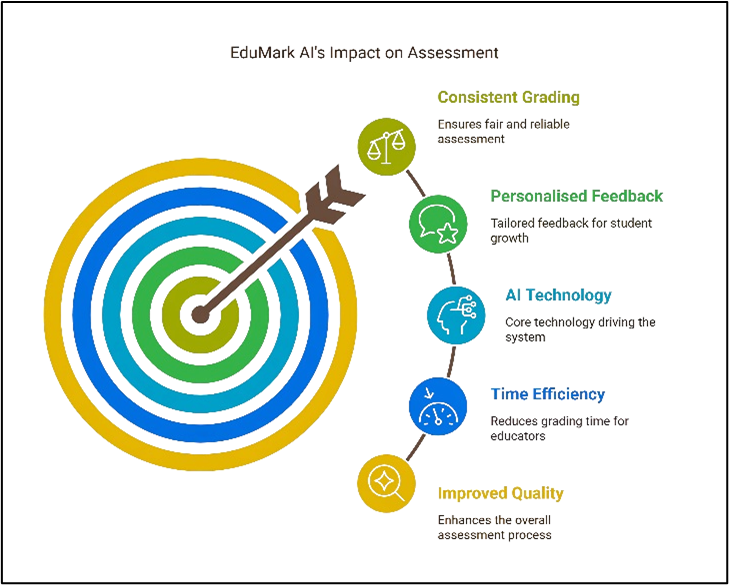Delivering rubric-aligned, real-time feedback with EduMark AI
Dr Deepshikha introduces EduMark AI, a proof-of-concept tool developed to explore how AI might support more consistent and personalised feedback in student assessment.

Imagine having the potential to enhance the consistency and clarity of student feedback while reducing the time spent on grading? At Queen Mary University of London (QMUL), educators in the School of Engineering and Materials Science (SEMS) face the complex task of delivering meaningful, personalised feedback across diverse assessment formats from laboratory reports to complex problem-solving tasks, while maintaining consistent standards across large cohorts.
Traditional assessment methods, although valuable, can introduce variability in the quality and consistency of feedback. Students often receive feedback that varies significantly between markers, making it difficult for them to understand the assessment criteria and track their progress effectively. As class sizes grow, maintaining the educational quality of feedback becomes increasingly challenging.
To address these educational challenges, we developed EduMark AI - an in-house tool created at Queen Mary University of London as part of a collaborative proof-of-concept pilot funded by the Drapers' Fund for Innovation in Teaching and Learning. Rather than simply automating grading, EduMark AI was designed with a clear educational mission: to enhance the consistency and quality of feedback while supporting more personalised student learning experiences.
 EduMark AI utilises advanced natural language processing and machine learning to evaluate various formats, including exams, lab reports, problem-solving tasks, and essays. We compared multiple tools, including ChatGPT, Google Gemini, and Co-Pilot, to assess their ability to accurately grade student work and generate feedback aligned with educator rubrics. Ethical approval for this pilot was formally granted by the QMUL Ethics of Research Committee (project ID: 0650), ensuring that the project adhered to institutional standards on the use of student data, transparency, and the responsible integration of AI in assessment and feedback. Our pilot study revealed that EduMark AI provides remarkably consistent feedback across student submissions. The system's grade distribution showed a more symmetrical and tightly clustered pattern compared to traditional marking, indicating greater reliability and standardisation in assessment, a crucial educational benefit for student fairness and learning progression. The system doesn’t just assign grades; it also provides rubric-based, personalised feedback in real-time, significantly improving the speed and quality of responses students receive. Importantly, staff retain complete oversight of all grades and feedback generated by EduMark AI. The tool is designed to support—not replace—academic judgement, ensuring that final grades and feedback reflect both algorithmic consistency and human insight. This hybrid approach offers students the best of both worlds: timely, rubric-aligned feedback, underpinned by educator expertise and accountability.
EduMark AI utilises advanced natural language processing and machine learning to evaluate various formats, including exams, lab reports, problem-solving tasks, and essays. We compared multiple tools, including ChatGPT, Google Gemini, and Co-Pilot, to assess their ability to accurately grade student work and generate feedback aligned with educator rubrics. Ethical approval for this pilot was formally granted by the QMUL Ethics of Research Committee (project ID: 0650), ensuring that the project adhered to institutional standards on the use of student data, transparency, and the responsible integration of AI in assessment and feedback. Our pilot study revealed that EduMark AI provides remarkably consistent feedback across student submissions. The system's grade distribution showed a more symmetrical and tightly clustered pattern compared to traditional marking, indicating greater reliability and standardisation in assessment, a crucial educational benefit for student fairness and learning progression. The system doesn’t just assign grades; it also provides rubric-based, personalised feedback in real-time, significantly improving the speed and quality of responses students receive. Importantly, staff retain complete oversight of all grades and feedback generated by EduMark AI. The tool is designed to support—not replace—academic judgement, ensuring that final grades and feedback reflect both algorithmic consistency and human insight. This hybrid approach offers students the best of both worlds: timely, rubric-aligned feedback, underpinned by educator expertise and accountability.
Impact: Enhanced Student Learning Experience
 The AI system generates rubric-based, personalised feedback that students can receive immediately, allowing them to understand their performance and areas for improvement in real-time. This immediate feedback loop is educationally valuable, enabling students to reflect on their work while it's still fresh in their minds and apply insights to future assignments.
The AI system generates rubric-based, personalised feedback that students can receive immediately, allowing them to understand their performance and areas for improvement in real-time. This immediate feedback loop is educationally valuable, enabling students to reflect on their work while it's still fresh in their minds and apply insights to future assignments.
Student responses to the pilot were overwhelmingly positive:
- All participating students found the feedback "extremely clear," supporting better learning outcomes
- Many students found the AI feedback comparable to or even better than traditional teacher feedback
- Students particularly valued the specific, actionable guidance for improvement
- High approval ratings indicate that students find AI-generated feedback educationally valuable
Rather than replacing educator feedback, students appreciated EduMark AI as a valuable supplement to support self-assessment and reinforce understanding. This aligns with Queen Mary’s ambition to embed AI literacy and foster reflective learning.
While our core focus is on improving feedback quality and assessment reliability, the project also revealed significant efficiency gains. EduMark AI amplifies educational expertise by handling routine assessment tasks, freeing educators to focus on higher-value activities such as curriculum development, personalised student mentoring, and innovative teaching approaches. The pilot demonstrated a 50-60% reduction in marking time, resulting in more time for meaningful educational interactions.
Next Steps: Expanding Educational Innovation Responsibly
 The positive results from our pilot study demonstrate strong potential for broader educational impact.
The positive results from our pilot study demonstrate strong potential for broader educational impact.
However, before considering any institutional rollout, we recognise the need for further pilots across a range of disciplines to ensure the approach is robust and beneficial across different academic contexts.
Our immediate next steps include:
- Additional pilot studies in diverse disciplines to validate educational effectiveness
- Development of a web-based application for seamless integration with institutional platforms like QMPlus and Turnitin
- Creation of best practice guidelines for AI in educational assessment
- Comprehensive evaluation across different subject areas and assessment types
These findings contribute directly to the Centre for Excellence in Artificial Intelligence in Education’s objective of embedding AI literacy in our programmes and align with Queen Mary's Strategy 2030 for innovation in learning and teaching.
EduMark AI represents more than a technological advancement; it embodies a pedagogically informed approach to educational enhancement. By prioritising consistency, quality, and personalisation in feedback, the system supports fundamental educational goals: helping students understand their progress, identify areas for improvement, and develop their academic capabilities more effectively.
In a landscape where time and quality are often at odds, EduMark AI shows we don’t have to choose. The pilot study results suggest that when implemented thoughtfully and ethically, AI can serve as a powerful ally in education, not by replacing the human elements that make learning meaningful, but by augmenting and enhancing the educational experience through more consistent, timely, and detailed feedback.
Dr Deepshikha
Teaching Fellow, School of Engineering and Materials Science
https://www.sems.qmul.ac.uk/staff/d.deepshikha